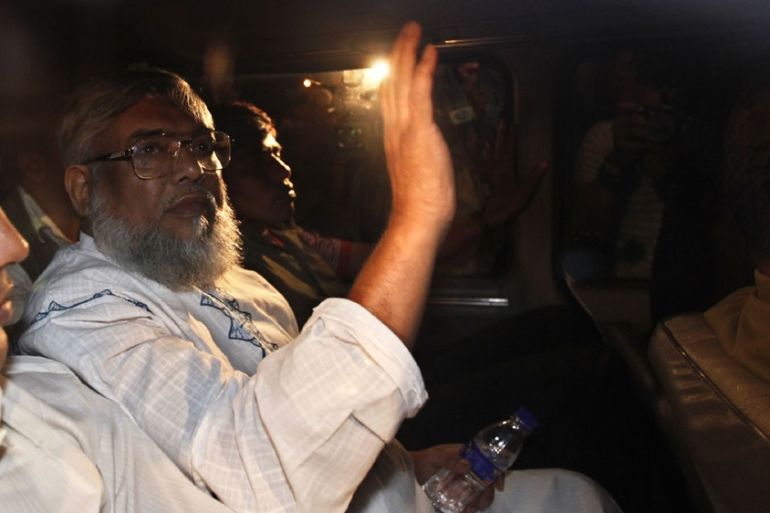Death sentences for two Bangladesh leaders upheld
Leaders from Islamist party and Bangladesh Nationalist Party may be hanged soon after clemency pleas rejected.

Dhaka – Bangladesh’s highest court has cleared the way for the government to execute two senior opposition politicians convicted of crimes against humanity during the country’s independence war in 1971.
On Wednesday, the Supreme Court dismissed a petition filed by Salauddin Quader Chowdhury and Ali Hasan Mohammed Mujahid – both of whom had requested the court to overturn its earlier decisions upholding the death penalty originally imposed by the International Crimes Tribunal.
Keep reading
list of 4 items‘Mama we’re dying’: Only able to hear her kids in Gaza in their final days
Birth, death, escape: Three women’s struggle through Sudan’s war
Revisiting molokhia amid war and displacement in Gaza
The tribunal established in 2010 has so far convicted 24 people of crimes against humanity and genocide during the nine-month war with Pakistan in 1971 that resulted in the death of hundreds of thousands of people. Bangladesh’s government says as many as three million were killed.

Most of those convicted by the tribunal, a domestic court, are leaders of Jamaat-e-Islami, an Islamist party that in 1971 supported the Pakistani military as then East Pakistan moved towards independence.
Jamaat, which was declared illegal in 2013, called for protests on Thursday against the court verdict, The Daily Star newspaper reported.
Two of its leaders have so far received the death penalty and Mujahid became the third.
Chowdhury was the first leader of the opposition Bangladesh Nationalist Party to receive the death penalty following a conviction for international crimes.
“This was a very right and proper decision,” Attorney General Mahbubey Alam said after the court verdict. “Justice has been done.”
However, Khandaker Mahbub Hossain, the lawyer who represented both men, disagreed. “The guilt of these two men has not been proved in accordance with the law,” he said.
The defence lawyer said it was now up to the government to decide when the men would be executed.
![Protesters, some of whom participated in the 1971 war of independence, rally outside the court in support of the verdict [Reuters/Ashikur Rahman]](/wp-content/uploads/2015/11/68a2b31f3c184659ae9200c368cadbb5_18.jpeg)
Chowdhury was sentenced to death for the commission of four offences committed in April 1971 in the southern district of Chittagong, three weeks after the beginning of the war.
One included the murder of a well known Hindu social worker in the village of Kundeshwari, the killing of four men in Sultanpur, and the killing of 50 people in the Hindu-populated village of Unsatturpara.
The court earlier this month refused to allow his lawyers to summon eight witnesses, including five from Pakistan, in support of his alibi that he was in Karachi and then Lahore at the time of the crimes.
Miscarriage of justice
|
|
| Can Bangladesh hold fair war crimes trial? |
Mujahid was sentenced to death for his role in “planning” and “conspiring with senior army officers” to kill 17 intellectuals in the last days of the 1971 war.
Earlier this month Amnesty International criticised Bangladesh’s handling of the two men’s cases.
“Their trial and appeals process were clearly flawed and since they now face the death penalty, the ultimate miscarriage of justice may be only days away,” David Griffiths, Amnesty International’s South Asia research director, said in a statement.
“The crimes committed during the war of independence were horrific, but the death sentences only perpetuate violence. The lack of fair trials makes the use of the death penalty even more disturbing.”